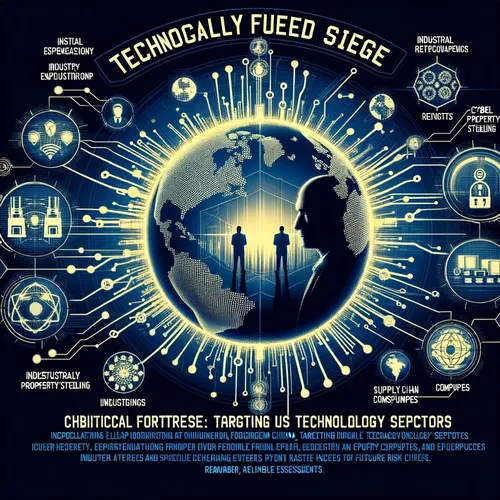Silicon Siege: US-China Hacker Olympics Heat Up! Spy Games, Shady Deals, and Quantum Fears
- Author
- Quiet. Please
- Published
- Fri 15 Aug 2025
- Episode Link
- https://www.spreaker.com/episode/silicon-siege-us-china-hacker-olympics-heat-up-spy-games-shady-deals-and-quantum-fears--67380609
This is your Silicon Siege: China's Tech Offensive podcast.
I'm Ting, your friendly cyber sleuth—equal parts nerd, mischief-maker, and expert in all things China, hacking, and digital skullduggery. Silicon Siege is heating up—these last two weeks have looked more like an Olympic hacker relay than regular business between the US and China. Grab your badge, listener, and let’s dive in.
Picture August kicking off with another wave of industrial espionage drama. According to CrowdStrike’s most recent Threat Hunting Report, cyber activity from nation-states—especially China—against US tech firms jumped almost 100% year-on-year. IP-rich companies in Silicon Valley have been waking up to attempts to breach everything from R&D cloud buckets to email servers holding the latest patent filings. Defense-linked contractors got special attention—think Lockheed Martin shaking down random PowerPoint decks for malware a la Beijing style.
And then there’s the supply chain shenanigans. Reuters reports that US authorities, deeply suspicious of AI chip diversions, have resorted to stashing actual tracking devices inside shipments of Nvidia and AMD servers bound for East Asia. Like a paranoid spy romance, Dell and Super Micro packaging apparently now boasts full Mission Impossible hardware—a tracker in the box and even sometimes built into shipping racks. US agents pop champagne every time they catch a smuggler off-guard; meanwhile, smugglers gossip on WeChat about the latest tracker locations. Nvidia CEO Jensen Huang, for his part, is busy denying any advanced chips are slipping past bans.
Insider threats are evolving: The Cipher Brief revealed that maintenance contracts for undersea cables—the literal pipes for global data—were quietly awarded to Chinese repair companies. This means the folks fixing the world’s data arteries might also be planting malware in repeaters or junction boxes, shunting data toward the nearest PLA data farm for future decryption. RADM Mike Studeman warns this isn’t theoretical; the data siphoning is underway, and he suspects Chinese intelligence has already stockpiled masses of US big data for when quantum decryption makes the impossible possible.
Chinese authorities, meanwhile, summoned the royalty of tech—Tencent, Baidu, ByteDance—for closed-door backdoor chats about their suspicious reliance on US-made H20 chips. CGTN and Xinhua voiced public alarm, branding the US “a surveillance empire” over its tracker tactics, and recommended ditching US hardware for government projects, citing possible kill switches and information vulnerabilities. The result? Tencent’s CTO was reportedly Googling “how to fast-track Huawei chip certification” at 2AM.
Strategic implications are as tangled as a zero-day exploit—Washington’s new export-for-revenue-sharing model lets certain lower-end chips through, but requires a slice of any revenue. Policy wonks argue this keeps China tethered to less capable tech while Beijing orders domestic firms to sideline Nvidia parts entirely. It’s a silicon cold war, folks, and trust is falling faster than a router under a DDoS storm.
The future risk? Industry experts warn of a never-ending chess match, where intellectual property, infrastructure, and supply chains are all up for grabs. The winners will be those who build not just secure tech, but resilient alliances and transparent standards. Thanks for tuning in, listener! Make sure you subscribe—don’t get caught in the crossfire, and keep your packets clean. This has been a quiet please production, for more check out quiet please dot ai.
For more http://www.quietplease.ai
Get the best deals https://amzn.to/3ODvOta
